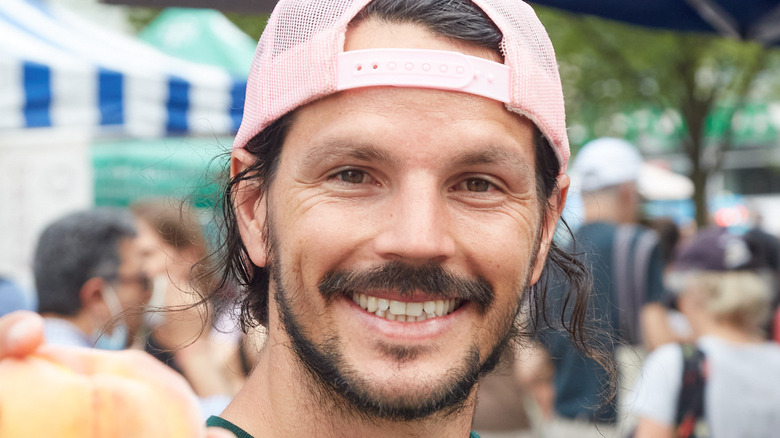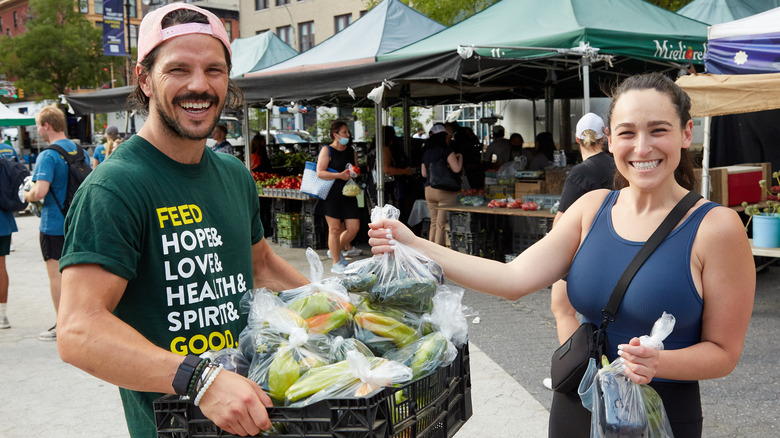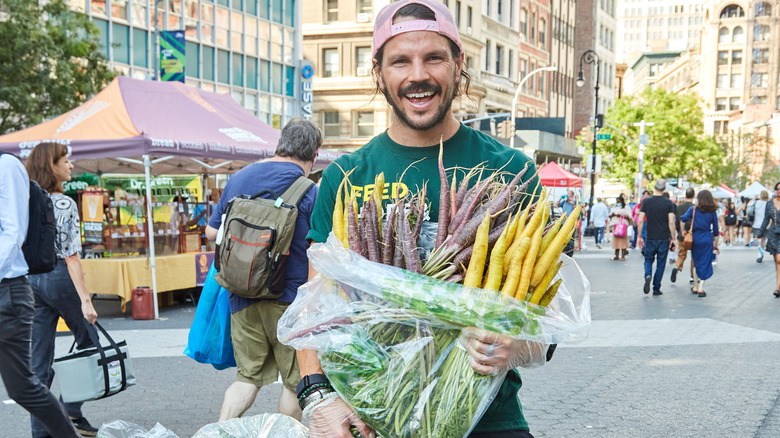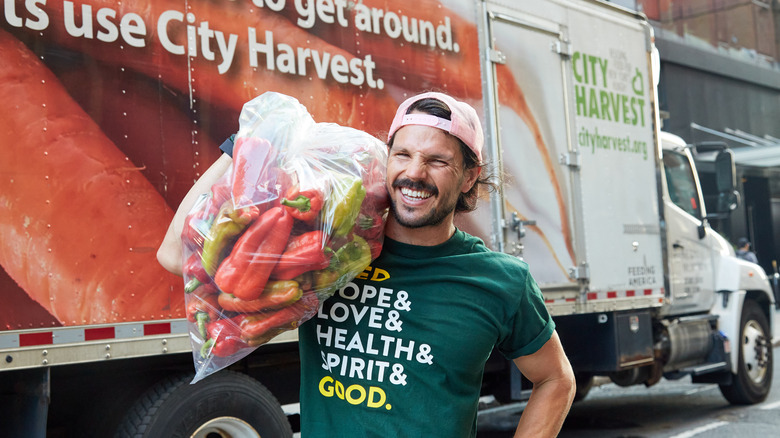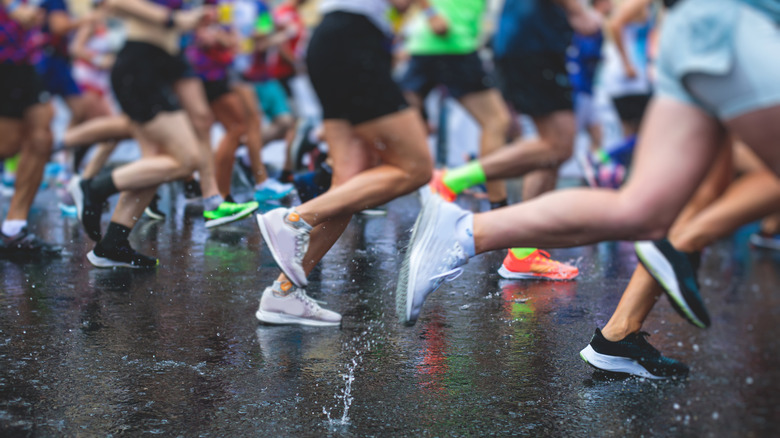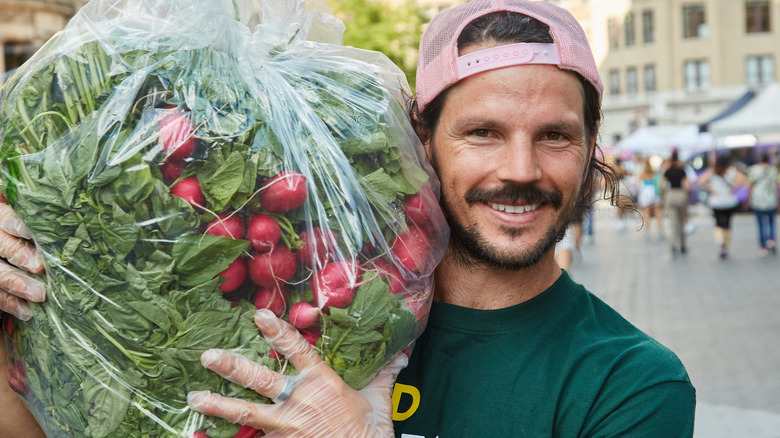Dan Churchill, Aka The Healthy Chef, On Healthy Eating And A Sustainable Way To Feed Families - Exclusive Interview
Every year, almost 40% of perfectly good food produced in America goes to waste. What if that food could be saved from the trash and served to the hungry? City Harvest is doing just that: It is the first and largest food rescue organization in New York City. Over the past 40 years, the group has rescued more than one billion pounds of nutritious food and delivered it to many soup kitchens and food pantries across the city. "One in five New Yorkers don't know where their next meal is coming from," says Dan Churchill. He shares that working with City Harvest has been one of the most rewarding experiences of his life.
Churchill is a chef, author, and restaurant owner known for colorful cooking that's easy, affordable, and nutritious. He has had a passion for cooking and good food since he was 9 years old and has spent many hours volunteering with City Harvest. He's running for the organization in the TCS New York City Marathon this year to help raise money to support the cause. In an exclusive interview with Health Digest, Churchill shares advice about diet plans, healthy eating tips and tricks, how to change up your workout when you've hit a wall, and more details about the profound work City Harvest is doing.
Find the right diet for you
Can you tell us a little bit more about your background and why you became a chef?
I became a chef after having a pretty awesome experience with my family, just loving food as a collective. We actually used to sit down around the TV watching cooking shows together. It was the one time all of us would get together and chat, something that was universally accepted. My dad loved the idea of his boys learning a life skill, so he put together a timetable, and we started cooking for each other, which was a really nice experience at the age of 11.
Fast forward, years to come — despite finishing high school and then actually doing a master's degree in exercise science, I was actually interning with the professional College of Sport in Australia as a training physician coach. When I was with these teams, I would actually be helping them with their players, [teaching] how to improve their nutrition through food. I created recipes for these athletes. I then turned [the recipes] into a cookbook, and that did well, and then I did that again. That is me in a nutshell.
Despite not initially pursuing my career as a chef, I started out cooking from home. Then, as a result of success as a self-published author, I jumped back into the kitchen professionally and started from scratch and learnt the ways of kitchen etiquette, from dishwashing right up to being an executive chef. From that day, [I was] thinking differently [and] finding ways to help people improve their performance through tasty, relatable food.
There's always been this tricky balance to show actually healthy and tasty food, and I've made it my life's work to perfect that balance. So [at] age 11, [I] started cooking; [I] became a chef professionally [at] around 19, 20 years old; and I've loved it ever since. When people say what a chef does, I'm pretty blessed to have created my own path. I've learned so much and made lots of memories that are always worth it. It's pretty cool.
Do you follow a specific diet plan? And can you share why or why not?
I do in a sense of how I operate a cohort of dishes and ingredients. But I wouldn't say it's paleo; I wouldn't say it's plant-based, specifically. I'm very much a plant-forward person; I advocate [for people] to eat more plants. Throughout my day, you'll find me finding ways to get more plants in my dishes. It's a way to be a bit creative; it's very much a bit of training.
I love Italian cuisine. I still have a lot of carbs. I eat plenty of good fats. My protein — I don't really eat that much red meat at all anymore. I still have it on the rare occasion. It's more of a sustainable way [to eat], but I love working with fish. You'll see me constantly putting out dishes that are full of abundance and color. Every person has the perfect diet for them, I always say. So I fit my diet. I don't fit anyone else's; I fit mine.
I help advocate [for] people to eat more plants, and I love that myself because the biggest differentiator in health is not being plant-based or eating meat; it's actually eating more plants, irrespective of whether you're plant-based or not.
Find healthy food that excites you
What's your favorite meal?
Without a doubt, the most astounding meal to me, ironically, is spaghetti bolognese. I say that because it's the dish that means so much to me from a family perspective. Cooking the pasta from scratch, learning the intricacies, even creating a great depth of flavor — it reminds me of my childhood, and I'm a child at heart. It's got beef in it, so I don't have it as much anymore. I actually substitute my own products. Bolognese itself — the bolognese we make as a product line out of mushrooms. But no doubt, if someone said, "What's the last meal you would have on Earth?" it would be that one.
What are your top three healthy-eating tips?
Oh, I've got so many. First and foremost, I don't think something's healthy unless it's tasty, so that's number one. I don't care what people say; if it's not tasty, it's not healthy. I know it's a soft opening, but that's true. You're not going to enjoy eating it again and again and again and keep doing something like healthy habits eating unless it's delicious. [The] number one rule is, in order for it to be healthy, it has to be delicious.
Number two — when you're cooking to actually try out a recipe, go look online at something that really, really, really excites you. In a way, that's a good challenge. Maybe sometimes you see a recipe that's a relatable protein or a vegetable that you want to cook with, something that you've always loved, whether it be pasta, or a breakfast dish, pancakes, tacos. Go find that and then dig in deep.
And the third thing is, I know this is not specific, but I always do say, when it comes to making things — everyone talks about the time it takes to cook them — make things in bulk. I know it's an obvious one, but people say it takes so long to cook something healthy. It doesn't always, but say it does take you some time: You've got many meals created out of one dish that will make you excited to be eating it. This also helps you repeat healthy habits.
One, it's got to be delicious. Two, cook something you're excited by. And three, if you are going to make something, cook it in bulk so you've got an option to actually have it again. Trust me. Side note: I make so much bolognese when I do make it [that] I eat it for [about] three days straight.
Surround yourself with people who lift you up
Do you have a specific workout routine?
Yeah. Right now it's very much designed around running, which is so funny. I'm doing a lot of running; I'm even running a marathon. I wouldn't classify myself as a runner because I grew up playing rugby and team sports and I have an anaerobic threshold. Right now, especially the last two months, it's been two tempo running sessions, one interval session, and a long run session. But overall, it's an interval session, resistance training, circuit training, some sort of organized team sport, like pickleball or something like that, and HYROX or one of the workouts. Lately, sometimes, that's tempo.
Do you have any tips for people who work out but seem to have hit a plateau and aren't really getting the results that they want?
There are a couple of things you can definitely address there. Number one — you've probably fallen into a lull for a couple of reasons. Either you're not being challenged anymore in your workout, or you've done the same type of workout day in, day out. Maybe the people around you aren't necessarily the ones that are inspiring you anymore. I used to be a trainer, so I used to have to mix it up myself for my clients. My explanation of why is, always do something you enjoy doing. If you find yourself going to kick a ball or drag around a box of cartons or SoulCycle — whatever it is that's actually what you enjoy, you're more than likely to do it again. I always say that if you hit a lull, find something you love again and pursue it.
Also, find ways to engage with [a] community that you love being around. I always say, you are a product of the people you surround yourself with, so do that within your fitness community. That's something people mention coming out of COVID — how often people address that's something they miss. That's always a great way to engage with [a] community and receive that support back, whether it be a running club or a surfing club. That's what we've done this year with the marathon, having our 100 runners from City Harvest engage [in] as many ways as [they] can. Training for a marathon is not easy, so having a team around you helps lift you up.
I would also say, give yourself a challenge. What's something you can look forward to? If you do a marathon and you train for something, are you training for yourself? Are you doing it for somebody else? Are you trying to hit a milestone? Is it something you've always wanted to do? Sometimes that can be a new way to challenge yourself and get you back on the right frame of work, as opposed to getting up and not really having a purpose.
Running for a cause
You're running for the New York City Marathon this Sunday as the captain of the City Harvest team. Can you tell us a little more about City Harvest and what they do?
Proudly. Being a chef and in this space, it brings me absolute joy to be working with an organization such as City Harvest that does two incredible things that I'm absolutely enamored by. One — feeding those in need. One in five New Yorkers don't know where their next meal is coming from. [It's] an unfortunate situation, but we're not talking about those individuals that are obvious. If you're living in an apartment building, one in five people in that building don't know where their next meal is coming from. That's pretty tough.
The other one is, particularly my line of work, rescuing food. Forty percent of food goes to waste, and City Harvest helps find ways to eliminate food waste [by] collecting food, whether it be from farmer's markets or restaurants. I can tell you firsthand it's one of the most rewarding experiences to go and do that myself. I went and did a couple of [volunteer] sessions this year at the Square Market, and it was an incredible experience.
[There are] two things they target: One [is] issues with climate and global warming. [Secondly,] in a world, particularly post-COVID, where half of the families are trying to get back on their feet, it's something that's needed. Being a part of City Harvest is a proud thing, and we're aiming to raise enough money to feed 1.2 million New Yorkers this year.
Does Team City Harvest have a donation goal for the marathon on Sunday?
Yeah, we do. We're wanting to reach half a million dollars, which would be incredible. Between 100 runners, all our respective friends, and companies that are associated with this, we're getting close. Every little bit can help us achieve our goal and a greater purpose, which is exciting.
You can donate to Team City Harvest here.
Food brings people together
[I] love your podcast, "The Epic Table." For the new listeners out there, can you share more about how it got started and the type of content that you cover?
In terms of it starting, I was blessed to meet people who would have these interesting conversations with me, and I was like, "I need to start recording these." And I'm like, "How do I do it in a big way?" So how it works is, I sit down with guests and I cook them a meal as we're discussing something super deep. It's like sitting down to a meal with someone in a very home-style environment. I want them to feel at home so they can be vulnerable [and] they can be honest. They also get a free meal out of it from me.
The thing is, they actually don't know the dish we're having until the end of the meal, until the end of the podcast. It's a great way to engage, and at the end of it, there's plenty of key takeaways, whether it be health-related, helping people improve their performance in general, maybe being inspired by a story, or we're talking about a topic around nutrition, or it's specific to the dish I'm cooking. There are a lot of things that are key takeaways.
Do you have a secret cheat food?
You're going to be very disappointed in me. I like the safe stuff! I like dark chocolate. I do actually like a good sweet potato fry and burger. It's that or roasted cashews. I'm actually really specific. I wish it was a specific waffle or something like that. I'm a big sweet potato fry and maybe a chicken burger kind of guy. Sweet potato fries, chicken burger — I love it. When I finish the run on Sunday, I'm going to get two burgers and a big basket of sweet potato fries. That's what I'm getting.
Dan Churchill is the captain of Team City Harvest at the TCS New York City Marathon this year.
This interview has been edited for clarity.

